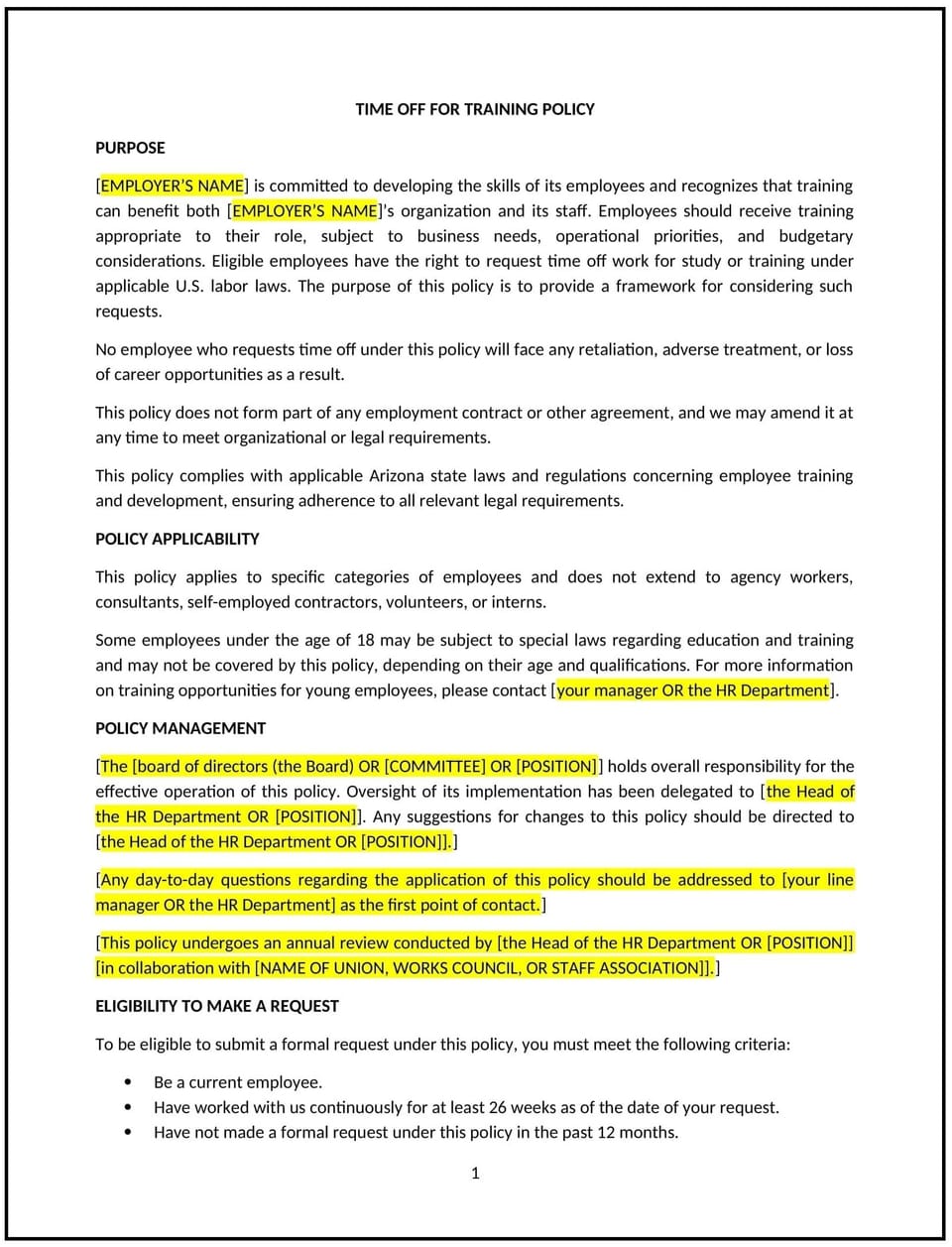Time-off for training policy (Arizona): Free template

Time-off for training policy (Arizona)
In Arizona, a time-off for training policy provides employees with the opportunity to take time away from work to attend training sessions, workshops, or educational programs that enhance their skills and contribute to their professional development. This policy helps ensure that employees have the necessary resources and support to improve their job performance while maintaining operational efficiency.
This policy outlines the procedure for requesting time off for training, the types of training eligible for time off, and the expectations regarding participation.
By implementing this policy, Arizona businesses can foster a culture of continuous learning and improve overall workforce capabilities.
How to use this time-off for training policy (Arizona)
- Define eligibility: Specify which employees are eligible for training time off, such as those in specific roles, departments, or those with a demonstrated need for professional development.
- Outline approved training programs: List the types of training that qualify for time off, including job-related courses, certifications, and workshops that contribute to employee growth.
- Set request procedures: Require employees to submit a formal request to HR or their supervisor, detailing the training program, dates, and expected benefits to the company.
- Address pay during training: Clarify whether training time will be paid or unpaid, and specify how paid leave will be managed, if applicable.
- Communicate expectations: Ensure employees understand that time off for training should not interfere with work duties or business needs and that they must demonstrate the value of the training program.
Benefits of using a time-off for training policy (Arizona)
This policy offers several advantages for Arizona businesses:
- Enhances employee skills: Provides employees with opportunities to acquire new skills and knowledge, improving their job performance and the overall capabilities of the team.
- Increases employee satisfaction: Demonstrates the company’s commitment to employee development, which can enhance morale and retention.
- Promotes business growth: A more skilled workforce contributes to greater productivity, innovation, and efficiency, benefiting the company’s bottom line.
- Supports compliance: Ensures that the business complies with any state or industry-specific training requirements while maintaining fair leave practices.
- Reduces turnover: Employees who feel supported in their professional development are more likely to remain with the company.
Tips for using this time-off for training policy (Arizona)
- Address Arizona-specific considerations: Ensure the policy complies with Arizona labor laws and industry-specific training requirements.
- Communicate clearly: Make sure all employees understand how to request time off for training and the criteria for approval.
- Track training opportunities: Keep a record of approved training programs and the impact they have on employee performance.
- Align training with business goals: Ensure that the training selected aligns with the company’s objectives and helps enhance employees' contributions to the organization.
- Review regularly: Update the policy as needed to reflect changes in business operations, training trends, or legal requirements.
Q: How does this policy benefit the business?
A: This policy ensures that employees receive relevant training to enhance their skills, which improves productivity, strengthens the workforce, and contributes to the business’s overall growth and success.
Q: How can the business manage training time-off requests effectively?
A: The business can manage requests by establishing clear procedures for approval, ensuring training does not disrupt operations. Supervisors and HR can assess if the training aligns with business needs and objectives.
Q: How does the business ensure that training is relevant?
A: The business evaluates training programs to confirm they align with strategic goals and directly benefit employee performance and the business's operational efficiency.
Q: How should the business handle the cost of training for employees?
A: The business can decide whether to cover training costs entirely or require employees to contribute, based on the type of training and its direct value to the business.
Q: What should the business do if multiple employees request time off for training at the same time?
A: The business should prioritize training requests based on job relevance and business needs, ensuring that coverage is maintained and operations run smoothly. A clear approval process will help manage such situations.
This article contains general legal information and does not contain legal advice. Cobrief is not a law firm or a substitute for an attorney or law firm. The law is complex and changes often. For legal advice, please ask a lawyer.


